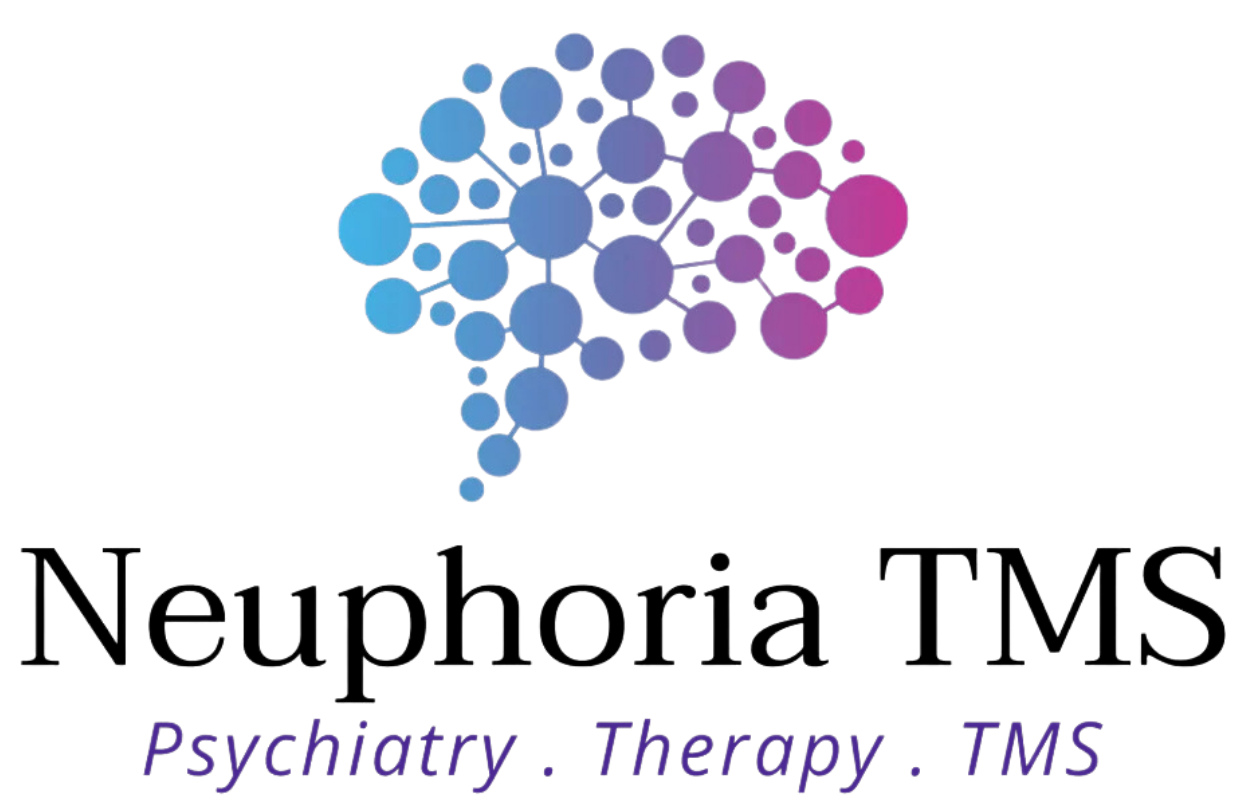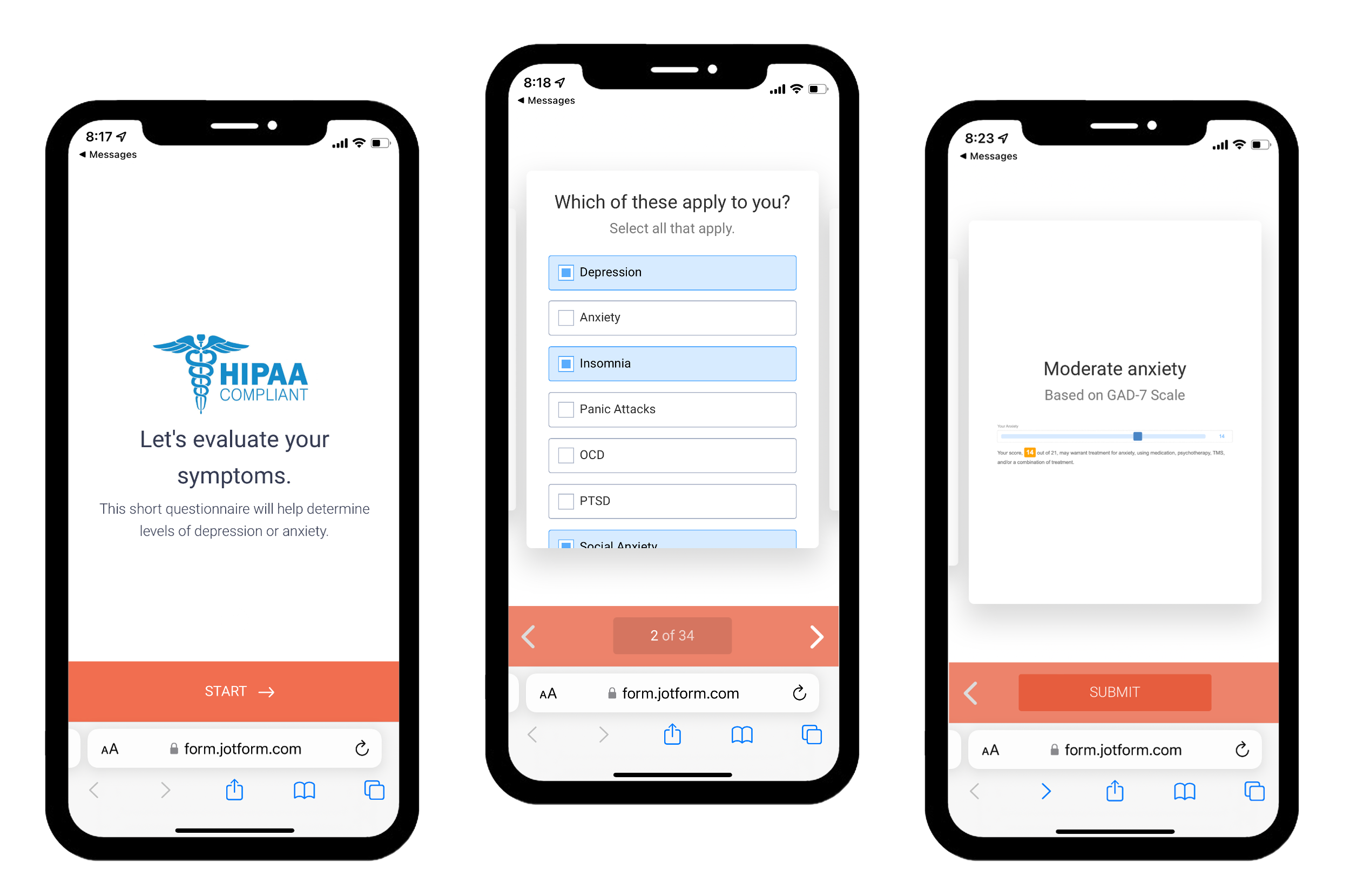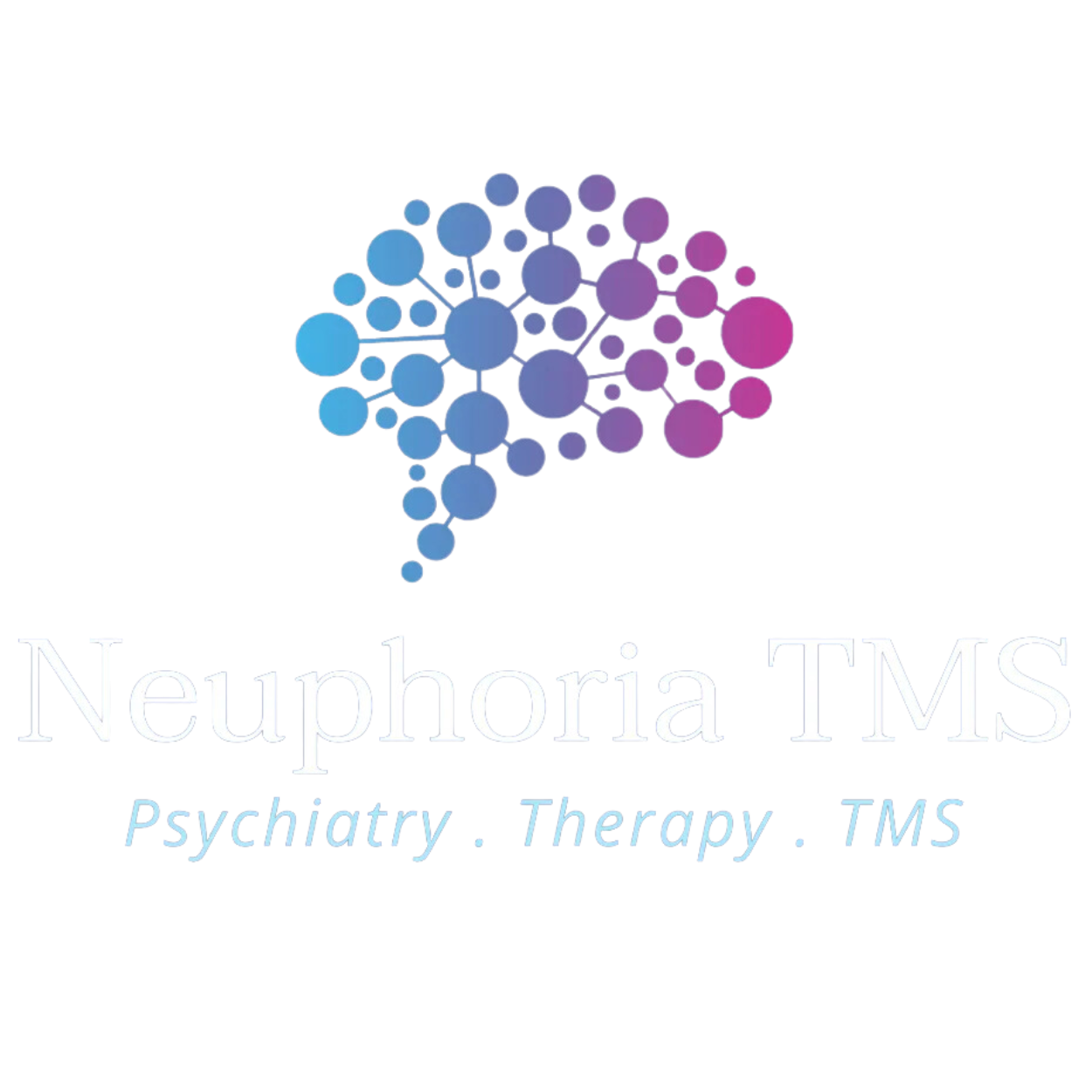Empowering Minds,
Restoring Balance
Everyone has battles to fight & hurdles to overcome - but there is hope for a better tomorrow. Specializing in the diagnosis and individually-tailored medication management for psychiatric disorders such as depression, anxiety, insomnia, mood disorder, ADHD, OCD, and PTSD. Neuphoria is here to support you on your mental health journey. To learn more or to schedule a consultation with a member of our team, click the link below.
Empowering Minds, Restoring Balance
Everyone has battles to fight & hurdles to overcome -
but there is hope for a better tomorrow. Specializing in the diagnosis and individually-tailored medication management for psychiatric disorders such as
depression, anxiety, insomnia, mood disorder and PTSD.
, Neuphoria is here to support you on your mental health journey. To learn more or to schedule a consultation with a member of our team, click the link below.
Welcome to

Neuphoria TMS provides advanced and innovative treatment to those affected by depression, anxiety, PTSD, OCD, ADHD, trauma, and other neurocognitive disorders. We offer life-changing therapy through Transcranial Magnetic Stimulation in addition to psychiatry and therapy services.
Welcome to

Neuphoria TMS provides advanced and innovative treatment to those affected by depression, anxiety, PTSD, OCD, ADHD and other neurocognitive disorders. We offer life-changing therapy through Transcranial Magnetic Stimulation in addition to psychiatry and therapy services.
Dr. ____, MD
Insert Doctor Bio
We accept insurance


Our Services
Our team of experienced and licensed professionals is dedicated to providing high-quality care and personalized treatment plans to help our clients achieve optimal health and wellness. With our medication management services, we provide comprehensive care that meets the unique needs of each individual we serve.
We offer a variety of evidence-based therapy approaches to address a range of mental health concerns, including depression, anxiety, trauma, and more. Our goal is to create a safe and compassionate space for our clients to explore their thoughts and emotions, and to develop personalized treatment plans that meet their unique needs.
We are excited to announce
that Neuphoria TMS now offers psychiatry services to complement our existing transcranial magnetic stimulation (TMS) treatments.
Dr. ____, MD
Insert Doctor Bio
WHAT IS TMS THERAPY?
A different way to treat depression.
What is TMS?
TMS (Transcranial Magnetic Stimulation) therapy is a non-invasive and FDA-approved treatment for various mental health conditions, including depression, anxiety, and obsessive-compulsive disorder (OCD). This therapy uses magnetic fields to stimulate nerve cells in the brain, which can alleviate symptoms and improve overall well-being.
How does TMS work?
TMS therapy works by using magnetic fields to stimulate specific areas of the brain that are associated with mood regulation and emotional processing. During a TMS session, a magnetic coil is placed against the scalp, and a rapidly changing magnetic field is generated, which induces an electrical current in the brain. This current can activate nerve cells that may not be functioning correctly, leading to improvements in symptoms related to depression, anxiety, and other mental health conditions. The exact mechanism by which TMS therapy produces its beneficial effects is still being studied, but it is believed to involve changes in neural plasticity and the release of neurotransmitters in the brain.
Is TMS for me?
Whether TMS therapy is right for you depends on various factors, including your specific symptoms, medical history, and treatment goals. TMS therapy has been shown to be effective for many individuals with depression, anxiety, and other mental health conditions, particularly those who have not responded well to traditional treatments such as medications or psychotherapy. However, it is important to consult with a healthcare professional to determine whether TMS therapy is a suitable option for you. A consultation with a TMS specialist can help you learn more about the treatment, its potential benefits, and whether it may be a good fit for your individual needs.
What does TMS feel like?
During a TMS (Transcranial Magnetic Stimulation) therapy session, you may feel a tapping or clicking sensation on your scalp where the magnetic coil is placed. This tapping sensation is typically painless and generally well-tolerated by most individuals. Some people also report feeling a mild headache or scalp discomfort during or after the treatment, but these side effects are usually temporary and go away shortly after the session is completed.
It's important to note that everyone's experience with TMS therapy is different, and some people may not experience any discomfort at all. If you have concerns about potential side effects or discomfort during TMS therapy, it's best to speak with a TMS specialist who can provide more detailed information and address any questions you may have.
Are there any side effects?
TMS (Transcranial Magnetic Stimulation) therapy is generally considered to be a safe and well-tolerated treatment for mental health conditions such as depression, anxiety, and obsessive-compulsive disorder. However, like any medical procedure, TMS therapy may be associated with some potential side effects.
Common side effects of TMS therapy include mild headache, scalp discomfort, and muscle twitching or spasms in the face or jaw during the session. These side effects are typically mild and short-lived, and can be managed with over-the-counter pain medication if needed.
Rarely, more serious side effects such as seizures or mania may occur, but these are extremely rare and typically only occur in individuals with certain pre-existing medical conditions. It's important to discuss any potential risks or concerns with a healthcare professional before starting TMS therapy.
Overall, TMS therapy is a safe and well-tolerated treatment option for many people with mental health conditions, and the benefits of the treatment generally outweigh the potential risks or side effects.
Is TMS covered by insurance?
Many insurance plans do cover TMS (Transcranial Magnetic Stimulation) therapy, but coverage varies depending on the specific plan and insurance provider. Some insurance plans may cover the full cost of TMS therapy, while others may cover only a portion of the cost or require a copayment or deductible. We're happy to check with your insurance provider to see if TMS therapy is covered under your plan and what your out-of-pocket costs may be.
We accept insurance


Our Services
Our team of experienced and licensed professionals is dedicated to providing high-quality care and personalized treatment plans to help our clients achieve optimal health and wellness. With our medication management services, we provide comprehensive care that meets the unique needs of each individual we serve.
We offer a variety of evidence-based therapy approaches to address a range of mental health concerns, including depression, anxiety, trauma, and more. Our goal is to create a safe and compassionate space for our clients to explore their thoughts and emotions, and to develop personalized treatment plans that meet their unique needs.
We are excited to announce
that Neuphoria TMS now offers psychiatry services to complement our existing transcranial magnetic stimulation (TMS) treatments.
It's not you, it's the brain.
Depression is caused by a lack of sufficient activity in the left dorsolateral prefrontal cortex, essentially the front left part of your brain.

When this area is working properly, the entire brain lights up, creating an improved mood, working memory, and selective attention. That's where TMS comes in.
WHAT IS TMS THERAPY?
A different way to treat depression.
What is TMS?
TMS (Transcranial Magnetic Stimulation) therapy is a non-invasive and FDA-approved treatment for various mental health conditions, including depression, anxiety, and obsessive-compulsive disorder (OCD). This therapy uses magnetic fields to stimulate nerve cells in the brain, which can alleviate symptoms and improve overall well-being.
How does TMS work?
TMS therapy works by using magnetic fields to stimulate specific areas of the brain that are associated with mood regulation and emotional processing. During a TMS session, a magnetic coil is placed against the scalp, and a rapidly changing magnetic field is generated, which induces an electrical current in the brain. This current can activate nerve cells that may not be functioning correctly, leading to improvements in symptoms related to depression, anxiety, and other mental health conditions. The exact mechanism by which TMS therapy produces its beneficial effects is still being studied, but it is believed to involve changes in neural plasticity and the release of neurotransmitters in the brain.
Is TMS for me?
Whether TMS therapy is right for you depends on various factors, including your specific symptoms, medical history, and treatment goals. TMS therapy has been shown to be effective for many individuals with depression, anxiety, and other mental health conditions, particularly those who have not responded well to traditional treatments such as medications or psychotherapy. However, it is important to consult with a healthcare professional to determine whether TMS therapy is a suitable option for you. A consultation with a TMS specialist can help you learn more about the treatment, its potential benefits, and whether it may be a good fit for your individual needs.
What does TMS feel like?
During a TMS (Transcranial Magnetic Stimulation) therapy session, you may feel a tapping or clicking sensation on your scalp where the magnetic coil is placed. This tapping sensation is typically painless and generally well-tolerated by most individuals. Some people also report feeling a mild headache or scalp discomfort during or after the treatment, but these side effects are usually temporary and go away shortly after the session is completed.
It's important to note that everyone's experience with TMS therapy is different, and some people may not experience any discomfort at all. If you have concerns about potential side effects or discomfort during TMS therapy, it's best to speak with a TMS specialist who can provide more detailed information and address any questions you may have.
Are there any side effects?
TMS (Transcranial Magnetic Stimulation) therapy is generally considered to be a safe and well-tolerated treatment for mental health conditions such as depression, anxiety, and obsessive-compulsive disorder. However, like any medical procedure, TMS therapy may be associated with some potential side effects.
Common side effects of TMS therapy include mild headache, scalp discomfort, and muscle twitching or spasms in the face or jaw during the session. These side effects are typically mild and short-lived, and can be managed with over-the-counter pain medication if needed.
Rarely, more serious side effects such as seizures or mania may occur, but these are extremely rare and typically only occur in individuals with certain pre-existing medical conditions. It's important to discuss any potential risks or concerns with a healthcare professional before starting TMS therapy.
Overall, TMS therapy is a safe and well-tolerated treatment option for many people with mental health conditions, and the benefits of the treatment generally outweigh the potential risks or side effects.
Is TMS covered by insurance?
Many insurance plans do cover TMS (Transcranial Magnetic Stimulation) therapy, but coverage varies depending on the specific plan and insurance provider. Some insurance plans may cover the full cost of TMS therapy, while others may cover only a portion of the cost or require a copayment or deductible. We're happy to check with your insurance provider to see if TMS therapy is covered under your plan and what your out-of-pocket costs may be.
It's not you, it's the brain.
Depression is caused by a lack of sufficient activity in the left dorsolateral prefrontal cortex, essentially the front left part of your brain.
When this area is working properly, the entire brain lights up, creating an improved mood, working memory, and selective attention. That's where TMS comes in.

Not sure if you need any of this?
Find out by taking this short assessment
Secure and confidential.

Or

Contact Info
Address: 1221 Medical Center Dr. Wilmington, NC 28401
Phone: (910) 239-0300
Fax: (910) 756-4546
Email: info@neuphorianc.com
Business Hours
Mon: 9am - 5pm
Tues: 9am - 5pm
Wed: 9am - 5pm
Thurs: 9am - 5pm
Fri: 9am - 5pm
Sat/Sun: Closed
For informational purposes only, a link to the federal Centers for Medicare and Medicaid Services (CMS) Open Payments web page is provided here. The federal Physician Payments Sunshine Act requires that detailed information about payment and other payments of value worth over ten dollars ($10) from manufacturers of drugs, medical devices, and biologics to physicians and teaching hospitals be made available to the public. It can be found at https://openpaymentsdata.cms.gov

Contact Info
Address: 1221 Medical Center Dr.
Wilmington, NC 28401
Phone: (910) 239-0300
Fax: (910) 756-4546
Email: info@neuphoriatms.com
Business Hours
Mon: 9am - 5pm
Tues: 9am - 5pm
Wed: 9am - 5pm
Thurs: 9am - 5pm
Fri: 9am - 5pm
Sat/Sun: Closed
For informational purposes only, a link to the federal Centers for Medicare and Medicaid Services (CMS) Open Payments web page is provided here. The federal Physician Payments Sunshine Act requires that detailed information about payment and other payments of value worth over ten dollars ($10) from manufacturers of drugs, medical devices, and biologics to physicians and teaching hospitals be made available to the public. It can be found at https://openpaymentsdata.cms.gov







